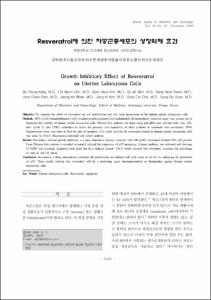KUMEL Repository
1. Journal Papers (연구논문)
1. School of Medicine (의과대학)
Dept. of Obstetrics & Gynecology (산부인과학)
Resveratrol에 의한 자궁근종세포의 성장억제 효과
- Keimyung Author(s)
- Cho, Chi Heum; Shin, So Jin; Kwon, Sang Hoon; Park, Joon Cheol; Rhee, Jeong Ho; Kim, Jong In; Cha, Soon Do; Yoon, Sung Do
- Department
- Dept. of Obstetrics & Gynecology (산부인과학)
- Journal Title
- 대한산부인과학회지
- Issued Date
- 2006
- Volume
- 49
- Issue
- 12
- Abstract
- Objective: To examine the effect of resveratrol on cell proliferation and cell cycle progression in the human uterine leiomyoma cells.
Methods: MTS [3-(4,5-dimethylthiazol-2-yl)5-(3-carboxymethoxyphenyl)-2-(4-sulfophenyl)-2H-tetrazolium] reduction assay was carried out to determine the viability of human uterine leiomyoma cells. Western blot analysis was done using anti pRB, anti- p21cip1/waf1, anti- p53, anti- cyclin E, anti CDK2 antibodies to detect the presence and expression of these proteins in treatment with resveratrol. DNA fragmentation assay was done to find the rate of apoptosis. Cell cycle analysis for resveratrol treated in human uterine leiomyoma cells was done by FACS (fluorescence-activated cell sorter) analysis.
Results: Resveratrol induced growth inhibition in a dose dependent manner, treatment with 100 WM/L resveratrol blocked 30% cell growth. From Western blot analysis it revealed resveratrol induced the expression of p53 increasing. Caspase pathway was activated and cleavage of PARP was occurred. Apoptosis took place but in a reduced manner. FACS results showed that resveratrol increased the percentage of cells in sub G1 phase.
Conclusion: Resveratrol, a dietry phytoalexin, inhibited cell proliferation and induced cell cycle arrest at sub G1 by enhancing the production of p53. These results indicate that resveratrol will be a promising agent chemopreventives or therapeutics against human uterine leiomyoma cells.
목적: 자궁근종세포에 resveratrol을 투여한 후 세포에 미치는 영향을 분석하여 치료에 유용한지를 알아보고자 하였다.
연구 방법: 자궁근종으로 수술 받은 10예의 환자에서 자궁근종과 정상 자궁근 세포를 배양하였다. Resveratrol의 자궁근종세포에 대한 세포생존율을 알아보기 위해 MTS 분석을 이용하였고, 세포 주기 회로에 관계하는 유전자의 발현을 보기 위해 Western blot analysis를 시행하였다. 세포주기분석은 FACS를 이용하였다.
결과: 일차 배양된 자궁근종세포에 resveratrol을 농도별로 처리한 결과 24시간 후 100 μM/L의 농도에서 30%의 증식억제 효과를 보였으며 농도가 증가할수록 증식억제 효과가 증가하였다. p53 단백은 농도가 증가할수록 발현이 증가하였고, resveratrol의 처리 농도에 비례하여 비활성 형태의 pro-caspase 3 단백질의 양적 감소와 PARP cleavage가 증가됨을 관찰하였고, pRB의 탈 인산화가 일어나는 것을 확인하였다. Resveratrol의 농도가 증가할수록 DNA 분절의 증가와, sub G1 주기의 지연 증가가 확인되어 세포자멸사의 양적 증거를 확인하였다.
결론: 이상으로 resveratrol이 자궁근종세포의 증식억제에 효과가 있으며, 이는 세포자멸사에 이르게 하고 세포주기와 세포자멸사에 관련된 유전자들의 발현에 영향을 미침으로써 향후 자궁근종의 치료나 예방에 있어서 효과적인 대체 치료 약물의 가능성이 있다고 사료된다.
- Alternative Title
- Growth Inhibitory Effect of Resveratrol on Uterine Leiomyoma Cells
- Publisher
- School of Medicine
- Citation
- 강보영 et al. (2006). Resveratrol에 의한 자궁근종세포의 성장억제 효과. 대한산부인과학회지, 49(12), 2598–2604.
- Type
- Article
- ISSN
- 1738-5628
- Appears in Collections:
- 1. School of Medicine (의과대학) > Dept. of Obstetrics & Gynecology (산부인과학)
- 파일 목록
-
-
Download
 oak-bbb-1485.pdf
기타 데이터 / 649.97 kB / Adobe PDF
oak-bbb-1485.pdf
기타 데이터 / 649.97 kB / Adobe PDF
-
Items in Repository are protected by copyright, with all rights reserved, unless otherwise indicated.